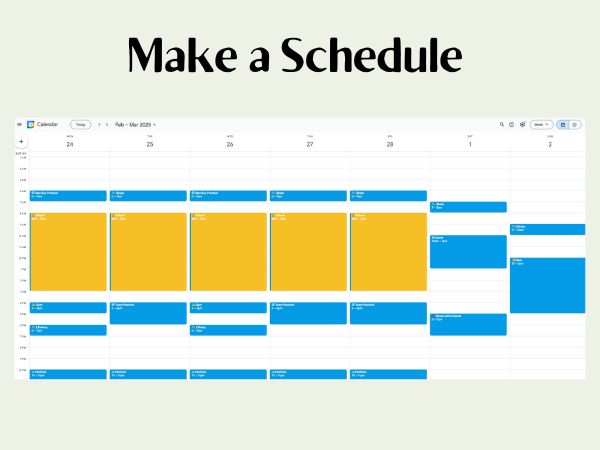Balancing school, sports, and social life can feel like juggling three balls at once—drop one, and everything can tumble. But with the right strategies, it’s possible to manage your time, reduce stress, and still enjoy all aspects of life.
Understand Your Priorities
Before creating a schedule, identify what’s most important to you.
- School: Grades and learning are the foundation for your future.
- Sports: Commitment to your team and personal fitness goals.
- Social life: Building relationships and enjoying free time.
Knowing your priorities helps you make smarter decisions when time is tight.
You can’t do everything perfectly—set priorities, and handle less important or non-urgent things lightly.

When I was in middle and high school, I only cared about being good at soccer haha
Create a Realistic Schedule

Use a Planner or App
Write down deadlines, practice times, and social plans. Apps like Google Calendar or Notion can help you visualize your week.

I highly recommend using Google Calendar. It’s free and easy to use.
Set Study Blocks
Reserve specific hours for homework and projects. Treat them as non-negotiable appointments.

It’s important to set a time for studying!
Limited time boosts focus!
Plan Recovery Time
Just like sports require rest days, your mind needs breaks. Include short downtime sessions to recharge.

Example:
Study: 30 minutes of focused work
Rest: 10 minutes short break
After 3 cycles, take 20 minutes
Stay Flexible but Consistent
Life doesn’t always go as planned—games get rescheduled, friends invite you out last minute, or assignments take longer than expected. You might fall in love, accidentally meet Elon Musk, or discover your neighbor is secretly a ninja.
- Adjust, don’t abandon your plan when changes happen.
- Keep your core routine (study time, practice, sleep) as consistent as possible.

Don’t blame yourself if things don’t go according to schedule.
Plan with enough flexibility so you can still get things done even when unexpected events pop up.
Avoid Burnout
Listen to Your Body
If you feel exhausted, it’s okay to skip a social event or reduce training intensity for a day.
A perfectionist is a complete fool
Perfectionists burn out easily because they set unrealistically high standards and create unrealistic schedules.
This constant pressure can lead to stress and exhaustion. While nothing is truly perfect, having the mindset to aim for your best—without demanding perfection—is what really matters.
Communicate with Others
Be open with coaches, teachers, and friends about your commitments.
- Let your coach know if a school project will impact practice.
- Ask teachers for extensions if games cause you to miss class.
Some people only try to be friends with people they like. But can they build good relationships with new teammates or coaches in a high-level environment?
You can’t control if someone likes you or not, but you can control how much you try to build trust.
Instead of acting just to be liked, try to help others. When you do that, you can see them as equals and have better relationships.

In high school, I couldn’t build a strong relationship of trust with my coach.
I wish I had tried to meet them halfway.
Make Time for Fun
A balanced life includes moments of joy.
- Hang out with friends after a big game.
- Enjoy hobbies unrelated to sports or school.

I used to go out for yakiniku with my friends after a big game.
Final Tip: Balancing school, sports, and social life isn’t about doing everything—it’s about making intentional choices so you can thrive in all three areas without feeling overwhelmed.



